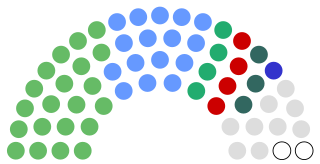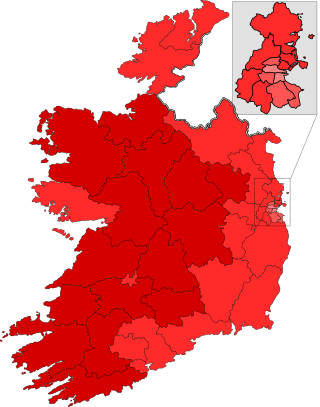Sinn Féin is an Irish republican and democratic socialist political party in both the Republic of Ireland and Northern Ireland.
Same-sex marriage has been legal in Ireland since 16 November 2015. A referendum on 22 May 2015 amended the Constitution of Ireland to provide that marriage is recognised irrespective of the sex of the partners. The measure was signed into law by the President of Ireland, Michael D. Higgins, as the Thirty-fourth Amendment of the Constitution of Ireland on 29 August 2015. The Marriage Act 2015, passed by the Oireachtas on 22 October 2015 and signed into law by the Presidential Commission on 29 October 2015, gave legislative effect to the amendment. Same-sex marriages in Ireland began being recognised from 16 November 2015, and the first marriage ceremonies of same-sex couples in Ireland occurred the following day. Ireland was the eighteenth country in the world and the eleventh in Europe to allow same-sex couples to marry nationwide.
The Third Amendment of the Constitution Act 1972 is an amendment to the Constitution of Ireland that permitted the State to join the European Communities, which would later become the European Union, and provided that European Community law would take precedence over the constitution. It was approved by referendum on 10 May 1972, and signed into law by the President of Ireland Éamon de Valera on 8 June of the same year.
The Eighth Amendment of the Constitution Act 1983 was an amendment to the Constitution of Ireland which inserted a subsection recognising "the equal right to life of the pregnant woman and the unborn". Abortion had been subject to criminal penalty in Ireland since at least 1861; the amendment ensured that legislation or judicial interpretation would be restricted to allowing abortion in circumstances where the life of a pregnant woman was at risk. It was approved by referendum on 7 September 1983 and signed into law on 7 October 1983. In 2018, it was repealed by referendum.
The Twenty-sixth Amendment of the Constitution Act 2002 is an amendment of the Constitution of Ireland which permitted the state to ratify the Treaty of Nice. It was approved by referendum on 19 October 2002 and signed into law on 7 November of the same year. The amendment followed a previous failed attempt to approve the Nice Treaty which was rejected in the first Nice referendum held in 2001.

The Fifteenth Amendment of the Constitution Act 1995 is an amendment of the Constitution of Ireland which removed the constitutional prohibition on divorce, and allowed for the dissolution of a marriage provided specified conditions were satisfied. It was approved by referendum on 24 November 1995 and signed into law on 17 June 1996.

Alex White is an Irish lawyer and a former Labour Party politician. Since January 2023 he has been Director General of the Institute of International and European Affairs, a think-tank based in Dublin. White served as Minister for Communications, Energy and Natural Resources from 2014 to 2016, Minister of State for Primary Care from 2012 to 2014 and Leader of the Labour Party in the Seanad 2007 to 2011. He served as a Teachta Dála (TD) for the Dublin South constituency from 2011 to 2016. He was a Senator for the Cultural and Educational Panel from 2007 to 2011.

The Twenty-eighth Amendment of the Constitution Bill 2008 was a proposed amendment to the Constitution of Ireland that was put to a referendum in 2008. The purpose of the proposed amendment was to allow the state to ratify the Treaty of Lisbon of the European Union.

The Twenty-eighth Amendment of the Constitution Act 2009 is an amendment of the Constitution of Ireland which permitted the state to ratify the Treaty of Lisbon of the European Union. It was approved by referendum on 2 October 2009.

Seanad Éireann is the senate of the Oireachtas, which also comprises the President of Ireland and Dáil Éireann.

Peadar Tóibín is an Irish politician who has served as leader of Aontú since January 2019. He has been a Teachta Dála (TD) for the Meath West constituency since 2011. He previously served as Chair of the Committee on Arts, Heritage, Regional, Rural and Gaeltacht Affairs from 2016 to 2018. He founded Aontú in January 2019.
The Thirtieth Amendment of the Constitution Act 2012 amended the Constitution of Ireland to permit Ireland to ratify the 2012 European Fiscal Compact and to preclude measures taken under the Compact from being held to be inconsistent with the Irish constitution. It was approved by referendum on 31 May 2012, by 60.3% to 39.7%, on a turnout of 50% and was signed into law by President Michael D. Higgins on 27 June 2012.
The Convention on the Constitution was established in Ireland in 2012 to discuss proposed amendments to the Constitution of Ireland. More commonly called simply the Constitutional Convention, it met for the first time 1 December 2012 and sat until 31 March 2014. It had 100 members: a chairman; 29 members of the Oireachtas (parliament); four representatives of Northern Ireland political parties; and 66 randomly selected citizens of Ireland.
The Thirty-first Amendment of the Constitution (Children) Act 2012 amended the Constitution of Ireland by inserting clauses relating to children's rights and the right and duty of the state to take child protection measures. It was passed by both Houses of the Oireachtas (parliament) on 10 October 2012, and approved at a referendum on 10 November 2012, by 58% of voters on a turnout of 33.5%. Its enactment was delayed by a High Court case challenging the conduct of the referendum. The High Court's rejection of the challenge was confirmed by the Supreme Court on 24 April 2015. It was signed into law by the President on 28 April 2015.

The Thirty-second Amendment of the Constitution Bill 2013 was a proposal to amend the Constitution of Ireland to abolish Seanad Éireann, the upper house of the Irish parliament, the Oireachtas. The proposal was rejected by the electorate in a referendum on 4 October 2013 by 51.7% voting against to 48.3% in favour.

The Thirty-fourth Amendment of the Constitution Act 2015 amended the Constitution of Ireland to permit marriage to be contracted by two persons without distinction as to their sex. Prior to the enactment, the Constitution was assumed to contain an implicit prohibition on same-sex marriage in the Republic of Ireland. It was approved at a referendum on 22 May 2015 by 62% of voters on a turnout of 61%. This was the first time that a state legalised same-sex marriage through a popular vote. Two legal challenges regarding the conduct of the referendum were dismissed on 30 July by the Court of Appeal, and the bill was signed into law by the President of Ireland on 29 August. An amendment to the Marriage Act 2015 provided for marriages permitted by the new constitutional status. The act came into force on 16 November 2015; the first same-sex marriage ceremony was held on 17 November 2015.

The Thirty-fifth Amendment of the Constitution Bill 2015 was a proposed amendment to the constitution of Ireland to reduce the minimum age of candidacy for the office of President of Ireland from 35 to 21. The bill was introduced to the Oireachtas in January 2015 by the Fine Gael–Labour government, after which both houses of the Oireachtas passed the bill. The bill was rejected by the electorate in a referendum on 22 May 2015 by 73.1% against to 26.9% in favour.

The Thirty-sixth Amendment of the Constitution of Ireland is an amendment to the Constitution of Ireland which permits the Oireachtas to legislate for abortion. The constitution had previously prohibited abortion, unless there was a serious risk to the life of the mother.

The Thirty-seventh Amendment of the Constitution is an amendment to the constitution of Ireland which removed the constitution's requirement to criminalise "publication or utterance of blasphemous matter". The amendment was effected by an act of the Oireachtas — the Thirty-seventh Amendment of the Constitution Act 2018, which was introduced in Dáil Éireann, passed by the Dáil and Seanad, approved by the people in a referendum, before it was signed into law by the president.
The Thirty-eighth Amendment of the Constitution of Ireland is an amendment to the Constitution of Ireland which altered the provisions regulating divorce. It removed the constitutional requirement for a defined period of separation before a Court may grant a dissolution of marriage, and eased restrictions on the recognition of foreign divorces. The amendment was effected by an act of the Oireachtas, the Thirty-eighth Amendment of the Constitution Act 2019.












